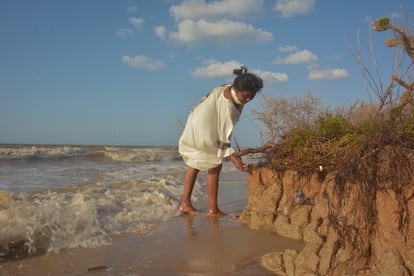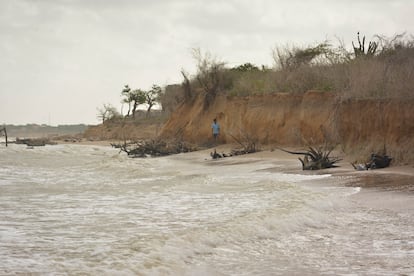‘All the hope of our culture is being swept away by the sea’: The cry for help of the Wayuu displaced by coastal erosion reaches Washington
A community living in Cachaca III, near Riohacha in Colombia, is being threatened by the sea, which is encroaching on their territory. On Thursday their case will be heard by the Inter-American Commission on Human Rights


The first clear signs began in 2005. The Wayuu community of Twuliá, located in a place known as Cachaca III, one kilometer away from Riohacha, in Colombia’s La Guajira region, began to notice how the sea was eating away at its coastline. The situation worsened in 2007, after six spurs were built in Riohacha to control coastal erosion in the capital. What was a solution for some, became a problem for the inhabitants of Cachaca III: after the spurs were built, the sea began hitting their area with more force, bringing more sediment and, once again, eating up the coast before their eyes. “In just two months, November and December, the community was able to measure how five meters were lost,” says the journalist Angie Serna, who has followed the case and shared what the community is experiencing in a podcast about damage from climate change.
The sea, so far, has taken away two homes, a swimming pool, a community hut, several trees, and an ancestor cemetery. It has also destroyed the landing area for fishing boats, their main means of subsistence. And despite the fact that the government, through Luis Carlos Barreto, the deputy director for Risk Knowledge of the National Unit for Risk and Disaster Management (Ungrd), has committed to carrying out a study to find ways to mitigate the situation, months have elapsed without anything happening. This fact motivated three people from the community to file a guardianship action — a legal resource in Colombia — in December 2023 against the government and other entities, and which, after the expiration of deadlines, has not yet been addressed by the Council of State.
“So far, five entire families are displaced in Bogotá. The progressive advance of coastal erosion put them in danger by leaving them without the means to survive,” explain the Wayuu leaders Pedro Fonseca Epiayu, Clarena Fonseca Uriana and Edwin Fonseca Redondo in the guardianship motion. Through this legal challenge, in which they appeal to the violation of 12 rights, including health, the vital minimum of water and “the violation of the human rights of people in situations of human mobility in contexts of climate change,” the community asked the Council to request two main things from the government. First, as a precautionary measure, for health personnel and water to be brought to Cachaca III. And second, to be informed of the status of the study that the Ungrd promised, as well as what its assigned budget is.
The case will be heard by the Inter-American Commission on Human Rights
While waiting for a response, this Thursday, February 29, more than 30 organizations from Latin America and the Caribbean will speak at a public hearing before the Inter-American Commission on Human Rights (IACHR) about a problem that is increasingly affecting the region: human displacement associated with climate change. Representing Colombia and with the help of the Latin American Center for Environmental Studies (Celeam), Clarena Fonseca Uriana, leader of Cachaca III, will present her case. Through a video — since she did not have enough time to obtain a visa to go to Washington — she will explain how coastal erosion in her community has caused five families to abandon their home and how, if the situation worsens, the scenario could play out again for herself and several other families.
“The damage we have experienced with the coastal impact is varied. There are also people at risk of losing their lives. Occasionally a ravine, weighing about a thousand tons, has nearly collapsed on a fisherman while he was at work,” she said. “All the hope of our culture is being swept away by the sea.”
“We must remember that a public hearing before the IACHR is not a judicial action, nor a lawsuit,” notes Andrés Aristizábal Isaza, director of strategic litigation at the Latin American Center for Environmental Studies (CELEAM). “So what we’re hoping is that the Court will hear this case, as well as those brought by the other 30 organizations, to raise the profile of the story and generate discussions about migration, displacement and immobility associated with climate change.” That is to say, it is not expected that there will be a sentence or ruling by the IACHR, but rather that the Commission will listen to them to generate a precedent and show that a legal and political debate must begin at the regional level about this topic.

An iconic case of coastal erosion litigation
In small steps, climate change has been creeping into the world of Colombian law. “The statement that, we hope, the Council of State will give, will serve as a milestone that will pave the way,” says Aristizábal. “When we began to litigate rights related to climate change, what we were seeking is for the state to generate public policies in this regard, because currently there is no updated legislation. We want institutions and policies to not act reactively, but preventively.”
This expert notes that, in the last six years, according to UNICEF data, coastal erosion has affected 2.3 million people in Latin America and that, in the next 30 years, 4.6 million people could be affected due to floods alone. In addition, data from the Colombian Ombudsman’s Office determined that, in the year 2023, 9,850 people were internally displaced due to issues associated with climate change.
For this reason, the Cachaca III case could become a watershed. “They have managed to make themselves visible,” adds Sierra. “But in reality there are more than 180 Wayuu communities that are living in coastal areas and experiencing the same conditions.” Whatever applies to Cachaca III would be a kind of pilot test for what is to come for all of them.
Sign up for our weekly newsletter to get more English-language news coverage from EL PAÍS USA Edition
Tu suscripción se está usando en otro dispositivo
¿Quieres añadir otro usuario a tu suscripción?
Si continúas leyendo en este dispositivo, no se podrá leer en el otro.
FlechaTu suscripción se está usando en otro dispositivo y solo puedes acceder a EL PAÍS desde un dispositivo a la vez.
Si quieres compartir tu cuenta, cambia tu suscripción a la modalidad Premium, así podrás añadir otro usuario. Cada uno accederá con su propia cuenta de email, lo que os permitirá personalizar vuestra experiencia en EL PAÍS.
¿Tienes una suscripción de empresa? Accede aquí para contratar más cuentas.
En el caso de no saber quién está usando tu cuenta, te recomendamos cambiar tu contraseña aquí.
Si decides continuar compartiendo tu cuenta, este mensaje se mostrará en tu dispositivo y en el de la otra persona que está usando tu cuenta de forma indefinida, afectando a tu experiencia de lectura. Puedes consultar aquí los términos y condiciones de la suscripción digital.








































